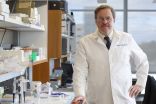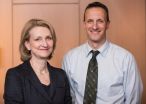(Press-News.org) A phase two study that investigated the potential of the drugs azacitidine (AZA) and lenalidomide (LEN), demonstrated that the two therapies in combination may be an effective frontline treatment regimen for patients with higher-risk forms of myelodysplastic syndrome and acute myeloid leukemia.
Myelodysplastic syndrome (MDS) is a type of cancer in which the bone marrow does not make enough healthy blood cells, resulting in abnormal (blast) cells in the blood and/or bone marrow. Higher-risk patients experience an unusually large percentage of blasts in their blood. Patients often develop infections, anemia, or excessive bleeding. Acute myeloid leukemia (AML) is a blood cell cancer and is the most common acute leukemia affecting adults, with incidences increasing with age.
The study, led by Guillermo Garcia-Manero, M.D., professor of leukemia at The University of Texas MD Anderson Cancer Center, shed new light on effective dosage schedule and amounts for the drugs, something previously unknown. The combination therapy was well tolerated in the study of 88 patients.
The study results were presented today by Courtney Dinardo, M.D., assistant professor of leukemia, at the 56th Annual Meeting of the American Society of Hematology (ASH) annual conference in San Francisco and were published in the Dec. 5 issue of the ASH journal Blood.
"Hypomethylating (HMA) agents such as AZA and LEN are currently the front line of therapeutic choice for patients with higher-risk MDS, and also frequently employed in elderly AML patients not otherwise eligible for standard intensive therapy," said DiNardo. "A number of combination strategies are under development to improve the results of HMA therapy. Given what we know about the effectiveness of AZA and LEN in patients with MDS and AML, a scientific rationale existed to explore this therapeutic combination strategy."
DiNardo's team evaluated the administration of AZA and LEN on days 6 to 10 of a 28-day cycle of treatment. The combination therapy appeared to be effective in patients presenting with as high as 30 percent blasts or abnormal blood/bone marrow cells.
"The responses were rapid with a median of two cycles for the drugs to be effective. Treatment with this dosage and schedule was well tolerated," said DiNardo.
INFORMATION:
Members of DiNardo's study team included Naval Daver, M.D., Eliza Jabbour, M.D., Tapan Kadia, M.D., Gautam Borthakur, M.D., Marina Konopleva, M.D., Ph.D., Naveen Pemmaraju, M.D., Hui Yang, M.D., Ph.D., Yue Wei, William Wierda, M.D., Ph.D., Jorge Cortes, M.D., Farhad Ravandi, M.D., Hagop Kantarjian, M.D., and Guillermo Garcia-Manero, M.D., all of the department of leukemia; and Carlos Bueso-Ramos, M.D, Ph.D., and Keyur Patel, M.D., Ph.D., department of hematopathology.
The study was funded by the National Institutes of Health (P30 CA016672), Celgene Corporation, the Edward P. Evans Foundation, and Fundación Ramón Areces.
HOUSTON - (Dec. 7, 2014) - An international consortium of researchers led by Baylor College of Medicine has identified for the first time a gene associated with familial glioma (brain tumors that appear in two or more members of the same family) providing new support that certain people may be genetically predisposed to the disease.
"It is widely thought amongst the clinical community that there is no association between family history and development of glioma. Because we know very little about the contributing genetic factors, when cases occur in two or more family ...
Patients who relapse in their battle with acute myeloid leukemia (AML) may benefit from a phase three study of therapies that combine an existing agent, cytarabine, with a newer compound, vosaroxin.
The study, led by Farhad Ravandi, M.D, professor of medicine, department of leukemia at The University of Texas MD Anderson Cancer Center, demonstrated increased survival rates, particularly in AML patients over age 60.
Ravandi's study results were presented today at the 56th Annual Meeting of the American Society of Hematology (ASH) annual conference in San Francisco and ...
Results from a large, prospective clinical trial add to mounting evidence that adolescent and young adult patients--aged 16 to 39 with acute lymphoblastic leukemia (ALL)--tend to fare better when treated with high-intensity pediatric protocols than previous patients who were treated with standard adult regimens.
The intergroup trial, presented at the 56th annual meeting of the American Society of Hematology, enrolled 296 adolescent and young adult patients with ALL. All participants were treated by adult hematologists-oncologists on a pediatric protocol, including four ...
SAN FRANCISCO (DECEMBER 7, 2014) - Researchers at Dana-Farber/Boston Children's Cancer and Blood Disorders Center report promising outcomes from a clinical trial with patients with a rare form of bone marrow failure who received a hematopoietic stem cell transplant (HSCT) after pre-treatment with immunosuppressive drugs only. This is the first trial reporting successful transplant in dyskeratosis congenita (DC) patients without the use of any radiation or conventional cytotoxic chemotherapy beforehand.
The trial's data were presented by study authors Leslie Lehmann, MD, ...
(SAN FRANCISCO, DECEMBER 7, 2014) - Recognizing that leukemia cannot be conquered with a "one-size-fits-all" approach, researchers are pursuing novel targeted therapies and combinations of existing treatment regimens with new agents for patient populations with historically poor prognoses, according to data presented today during the 56th American Society of Hematology (ASH) Annual Meeting and Exposition.
In recent years, outcomes for patients with leukemia have steadily improved with the emergence of numerous therapies that target specific genetic drivers of disease, ...
SAN FRANCISCO, CA, December 7, 2014--A new type of cancer therapy that targets an oncometabolite produced dramatic results in patients with advanced leukemia in an early-phase clinical trial. The study, led by Eytan M. Stein, MD, a medical oncologist at Memorial Sloan Kettering Cancer Center, was presented today at the 56th Annual Meeting of the American Society of Hematology.
Approximately 15 percent of acute myeloid leukemia patients have a mutated form of the IDH2 gene. IDH2 normally makes a protein that plays a critical role in cell metabolism. However, when the gene ...
UNSW Australia's solar researchers have converted over 40% of the sunlight hitting a solar system into electricity, the highest efficiency ever reported.
The record efficiency was achieved in outdoor tests in Sydney, before being independently confirmed by the National Renewable Energy Laboratory (NREL) at their outdoor test facility in the United States.
The work was funded by the Australian Renewable Energy Agency (ARENA) and supported by the Australia-US Institute for Advanced Photovoltaics (AUSIAPV).
"This is the highest efficiency ever reported for sunlight conversion ...
The "molecular mail" sent by multiple myeloma cells provides clues to how well patients with the disease are likely to respond to treatment, according to a study being presented at the annual meeting of the American Society of Hematology (ASH) by researchers at Dana-Farber Cancer Institute.
The findings - to be presented in poster form on December 6, from 5:30 PM to 7:30 PM, in the West Building, Level 1 - may ultimately guide doctors in deciding which therapies are best for individual patients with myeloma, the study authors say.
The study focused on ...
An innovative cell therapy against a highly aggressive form of acute lymphoblastic leukemia (ALL) continues to show highly promising results in children treated in a pilot study. Ninety-two percent of the 39 children receiving bioengineered T cells had no evidence of cancer at one month after treatment, with this complete response persisting in some cases for more than two years. The personalized cell therapy reprograms a patient's immune system and offers the potential of long-term success.
"As we continue to follow children in this study, we see exciting results for ...
SAN FRANCISCO - A therapy that liberates the immune system to attack cancer cells drove Hodgkin lymphoma (HL) into complete or partial remission in fully 87 percent of patients with resistant forms of the disease who participated in an early-phase clinical trial, investigators at Dana-Farber Cancer Institute and partnering institutions report in a study published today in the New England Journal of Medicine and simultaneously presented at the annual meeting of the American Society of Hematology (ASH) in San Francisco.
The results provide some of the most dramatic evidence ...




